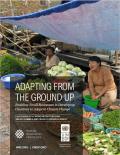This report explores how a number of African countries are designing systems to simultaneously achieve their climate targets and the Sustainable Development Goals (SDGs). Building on a study of Asian Nationally Determined Contributions (NDCs), the report takes an in-depth look at NDCs of seven African countries: Burkina Faso, the Central African Republic (CAR), Ghana, Malawi, Niger, Swaziland, and Zambia, and analyzes NDCs of several other African countries.
In a new report, 'Nature is too big to fail – Biodiversity: the next frontier in financial risk management', PwC Switzerland and WWF Switzerland find that the financial risks associated with the loss of biodiversity will become increasingly important in 2020 - especially in the lead up to the United Nations Biodiversity Conference in October in Kunming (China).
As climate change and the loss of biodiversity mutually reinforce each other, decision-makers face a huge challenge to respond to this double crisis, as the risk of financial market instability significantly increases.

This report proposes a step-by-step framework for addressing the needs of small businesses in adapting to climate change. It discusses the factors driving micro and small enterprises (MSEs) to invest in adaptation, the breadth of barriers that they face, and interventions that policymakers can implement to address these barriers. It also includes detailed case studies on Zimbabwe, Cambodia, Tajikistan, and Nicaragua.
This report examines the transition risks to the economy of South Africa—and its government, municipalities, companies, and financial institutions—from a global economic transition to a low-carbon economy. The analysis in the report not only quantifies the downside risk of South Africa’s transition, but it also forecasts some of the potential benefits of a transition such as the impact of a lower global oil price that is passed through to consumers.
The Global Risks Report is an annual publication by the World Economic Forum (WEF) ahead of their annual meeting in Davos, Switzerland. Each year, it monitors the global risk landscape by assessing likelihood and interconnectedness of risks based on data collected through the annual Global Risks Perception Survey, completed by approximately 800 members of the Forum’s diverse communities.
